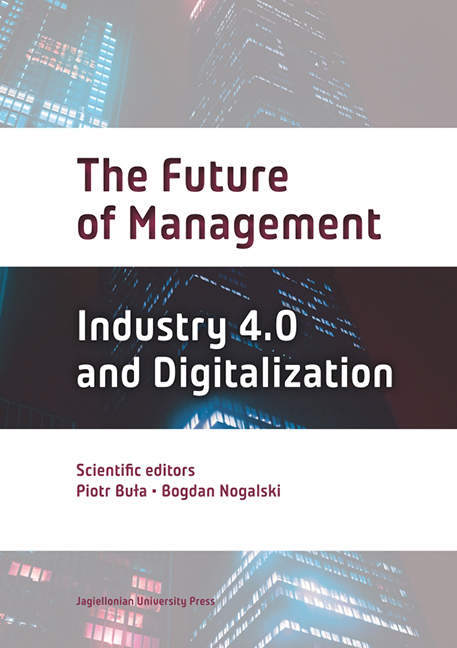Book contents
- Frontmatter
- Contents
- Preface
- Industry 4.0: Social Impacts and Operations Management Challenges
- Business Model Changes in the Presence of Challenges Brought by Industry 4.0
- Communication in Traditional and Network Organisation: Transformation
- Consequences of the Fourth Industrial Revolution in Social and Economic Development in the 21st Century
- Ideology, Trust, and Spirituality: A Framework for Management Control Research in the Era of Industry 4.0
- Renewable Energy through Industry 4.0 on the Example of Photovoltaic Development in Selected European Countries
- Employee Loyalty in the ICT Sector as a Challenge for Building Industry 4.0
- The Importance of Flexibility of Human, Tangible and Intangible Resources in Selected Production Entrepreneurships: Results of Empirical Research
- Challenges Posed for Universities by the Industry 4.0 Environment
- Big Data in Managing Marketing Communication
- Mathematical Risk Assessment Method in the Implementation of Logistic Processes
- Management and Digitisation
- Branding of Time as a New Direction in Tomorrow’s Management
- The Future of Branding
Ideology, Trust, and Spirituality: A Framework for Management Control Research in the Era of Industry 4.0
Published online by Cambridge University Press: 16 November 2021
- Frontmatter
- Contents
- Preface
- Industry 4.0: Social Impacts and Operations Management Challenges
- Business Model Changes in the Presence of Challenges Brought by Industry 4.0
- Communication in Traditional and Network Organisation: Transformation
- Consequences of the Fourth Industrial Revolution in Social and Economic Development in the 21st Century
- Ideology, Trust, and Spirituality: A Framework for Management Control Research in the Era of Industry 4.0
- Renewable Energy through Industry 4.0 on the Example of Photovoltaic Development in Selected European Countries
- Employee Loyalty in the ICT Sector as a Challenge for Building Industry 4.0
- The Importance of Flexibility of Human, Tangible and Intangible Resources in Selected Production Entrepreneurships: Results of Empirical Research
- Challenges Posed for Universities by the Industry 4.0 Environment
- Big Data in Managing Marketing Communication
- Mathematical Risk Assessment Method in the Implementation of Logistic Processes
- Management and Digitisation
- Branding of Time as a New Direction in Tomorrow’s Management
- The Future of Branding
Summary
Abstract
The forthcoming era of Industry 4.0 will bring new challenges for management control (MC) research and practice. Extant studies demonstrate that organisations characterised by a high level of technological complexity and innovation capability need control forms based more on social than on cybernetic mechanisms. Although many frameworks concerning MC research have been developed over the last half century, they have not included important forms of social control, such as ideology, trust, and spirituality. Thus, the study is going to fill the gap and propose a renewed framework for management control research. This framework contributes to the MC literature by supplying a more thorough and unequivocal description of normative control modes, such as trust, ideology, and spirituality as well as of the relationships among them.
Keywords: management control, Industry 4.0, framework, MC research, spirituality, ideology
Introduction
Managerial control (MC) has been present in management literature for over a century, and with time, the phenomenon has covered more and more types of organisations and dimensions of organisational activities. In the beginning, there were two different, although interwoven streams of research, one concerning control in industrial organisations conducted by such researchers as F. W. Taylor, H. Emerson, H. Ford or H. Fayol, and the second in bureaucracy, initialised by M. Weber. In these approaches, direct supervision of employee behaviour or precise measurement of their output, as well as authority and hierarchy, were the main mechanisms of control in the industry and in administration. In organisations populated by professionals, like hospitals and universities, whose performance is hardly measurable, both individual professionals and whole organisations are coordinated and controlled differently, based on collegial and trust mechanisms.
With time, however, control practices from industrial and bureaucratic organisations were also applied to professional organisations, mainly to hospitals, as the biggest and most complex entities. The introduction of “corporatist managerialism” based on simple bureaucratic control modes into public-sector service organisations in the United Kingdom during the 1970s as a response to increasing organisational complexity, left trust-based professional autonomy largely intact but did not bring a substantial effect. Therefore, during the 1980s and 1990s, in the UK, Sweden, the US, Poland and other countries, a new wave of “entrepreneurial governance” or “new managerialism” was introduced in public-sector service organisations.
- Type
- Chapter
- Information
- The Future of ManagementVolume Two: Industry 4.0 and Digitalization, pp. 72 - 91Publisher: Jagiellonian University PressPrint publication year: 2022

